Producing quality wine using biodynamics and ‘eggs’
19th February 2024
After selling his IT business and taking early retirement, a chance meeting with Stephen Skelton at a conference convinced Nick Wenman that you could make great wine in the UK. In 2009 Nick planted Albury Organic Vineyard, finally fulfilling his dream of owning a vineyard and making quality biodynamic wine. Editor Rachel Hicks chatted with him.
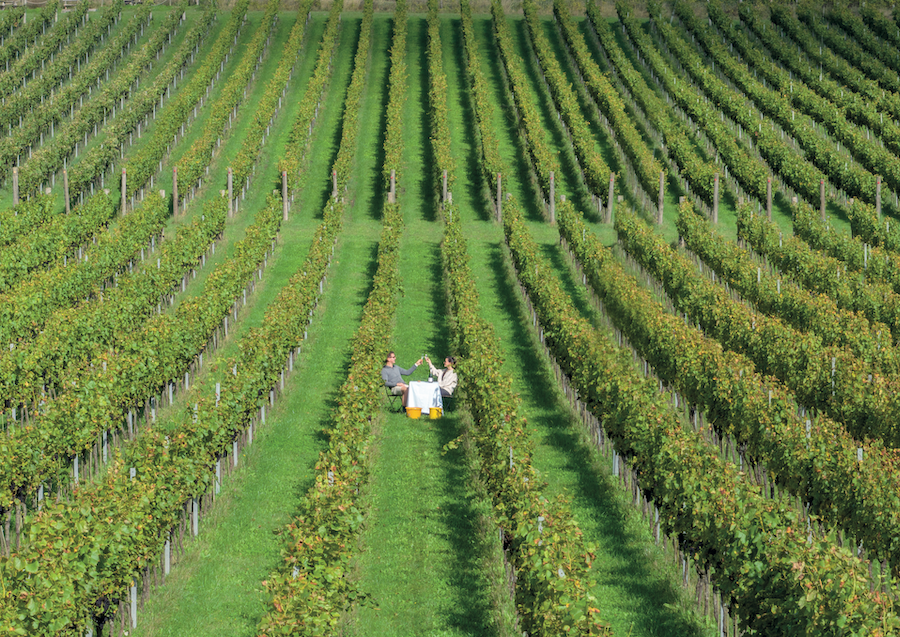
Albury Organic Vineyard is situated on the southern slopes of the North Downs in the beautiful Surrey Hills, on a gentle slope running north to south.
The land is owned by Albury Estates, who are trustees for the Duke of Northumberland. Vineyard owner Nick Wenman has a long lease on the land, and the Estate is also now a minor shareholder in the vineyard. Prior to planting, the land had been farmed for cereal crops for many years, although there are records of vines being planted in Albury by John Evelyn dating back to 1645. Nick established Albury Organic Vineyard in 2009.
Exceptional harvests
The vines are the traditional Champagne varietals of Chardonnay, Pinot Noir and Pinot Meunier, as well as Seyval and a small amount of Pinot Gris.
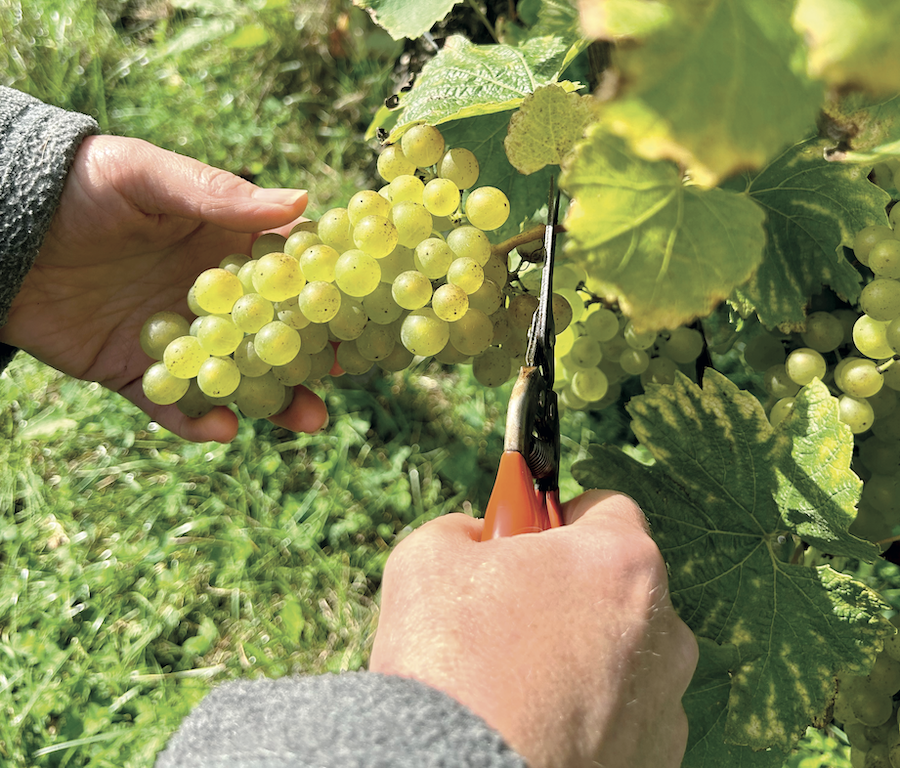
The initial 5ha were planted in 2009 and a further 3ha followed in 2020. The vines are on a variety of rootstocks, but Nick has found that Fercal and 41B are best suited to the Albury site.
The initial grape varieties were chosen because, at that time, the wines considered to be the highest quality and most popular in the UK were those being produced using the traditional sparkling varieties.
Nick also planted some Seyval Blanc because, although not a classic Champagne variety, it had been used successfully in blends in the UK by well-established vineyards such as Camel Valley. Its disease resistance for downy and powdery mildew is also ideal for an organic vineyard.
The initially tiny amount of Pinot Gris, Nick explains, was just because his wife wanted some Pinot Gris!
Albury does make a small amount of Pinot Gris-based still wine each year, but more has been planted on the newest part of the vineyard, so this will increase once those vines are in production.
Nick is also looking at producing a Pinot-based still wine in the future, which will likely be a blend of perhaps Pinot Gris, Pinot Noir or Pinot Meunier first pressings.
Currently, the vineyard averages 20 tonnes per year in yield from the initial 5ha. However, 2018 saw an exceptional yield of 37t. The later planting is not in production yet.
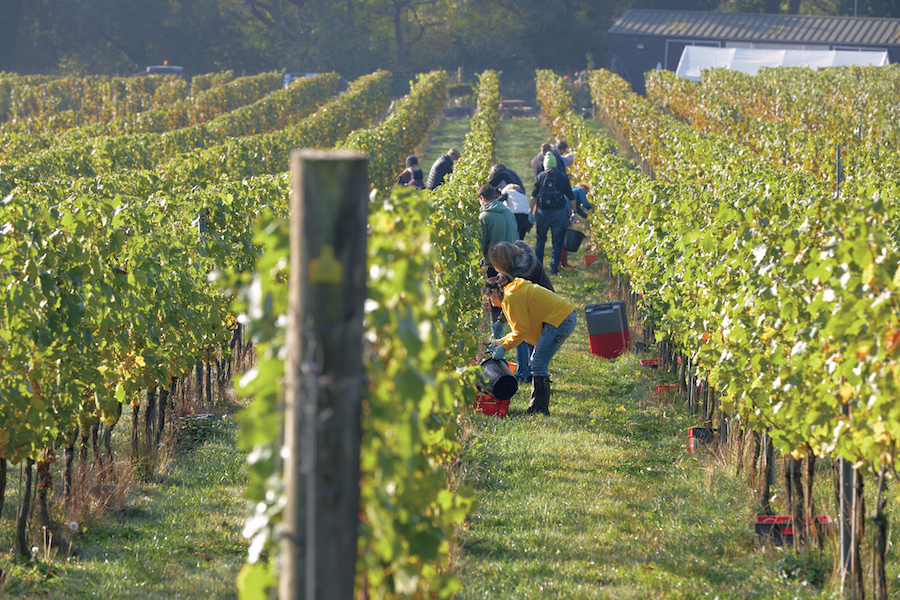
For many vineyards, 2023 was an exceptional harvest, and it was certainly above average for Nick, although not quite as good as their previous best. “Overall, last year was very good with a yield of around 28t of excellent biodynamic fruit,” he shares.
“We had very little frost in the spring and very good fruit set in late June/early July. The fruitfulness of the vines this year was also good as a result of the dry summer in 2022. July last year was extremely wet, which resulted in some downy mildew – which is hard to manage when you’re organic. However, the vineyard team did an excellent job and very little fruit was lost through disease. The exceptionally warm weather in September was essential in order to ripen what turned out to be a big yield.”
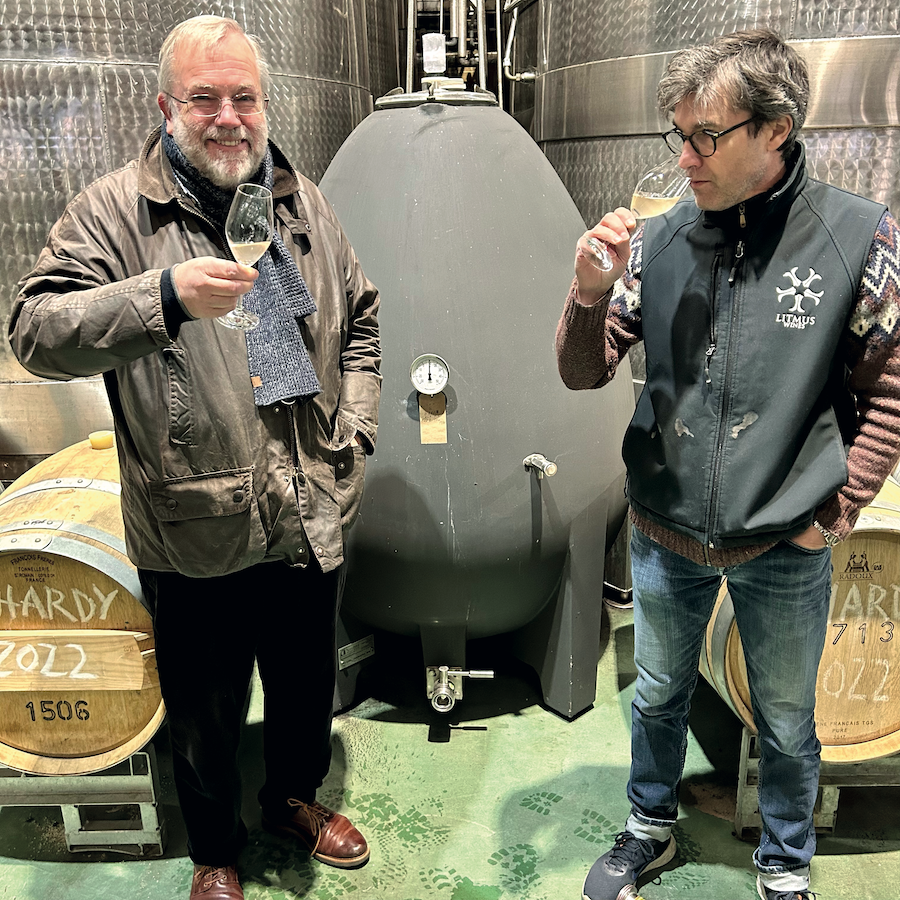
Grapes are all harvested by hand, using a team of local volunteers as well as some contract support if needed.
Nick and his team are fully committed to producing organic fruit without the use of ag-chems, and produce high-quality English wine – including a still rosé and quality sparkling wines made using the Traditional method – a classic Cuvée, Blanc de Blancs, Blanc de Noir, and some vintages, as well as a soon-to-be released biodynamic wild ferment Blanc de Blancs, which has been fermented in concrete eggs.
Nick explains: “Concrete eggs are used in Champagne production a fair bit, and the idea is that they encourage the natural movement of the wine and the lees around the egg, helping the lees work with the wine to benefit the flavour.
“The porosity of the concrete also allows the tiniest amounts of oxygen to permeate the wine, changing the fermentation process – something which you don’t get with stainless steel tanks, which are completely inert. The effect is similar to that of using oak barrels.”
The wild ferment wine will be released this May, but there will be a very limited amount available – only around 600 bottles.
All of Albury’s still and sparkling wines are produced by Litmus Wines in nearby Dorking.
Back-breaking work
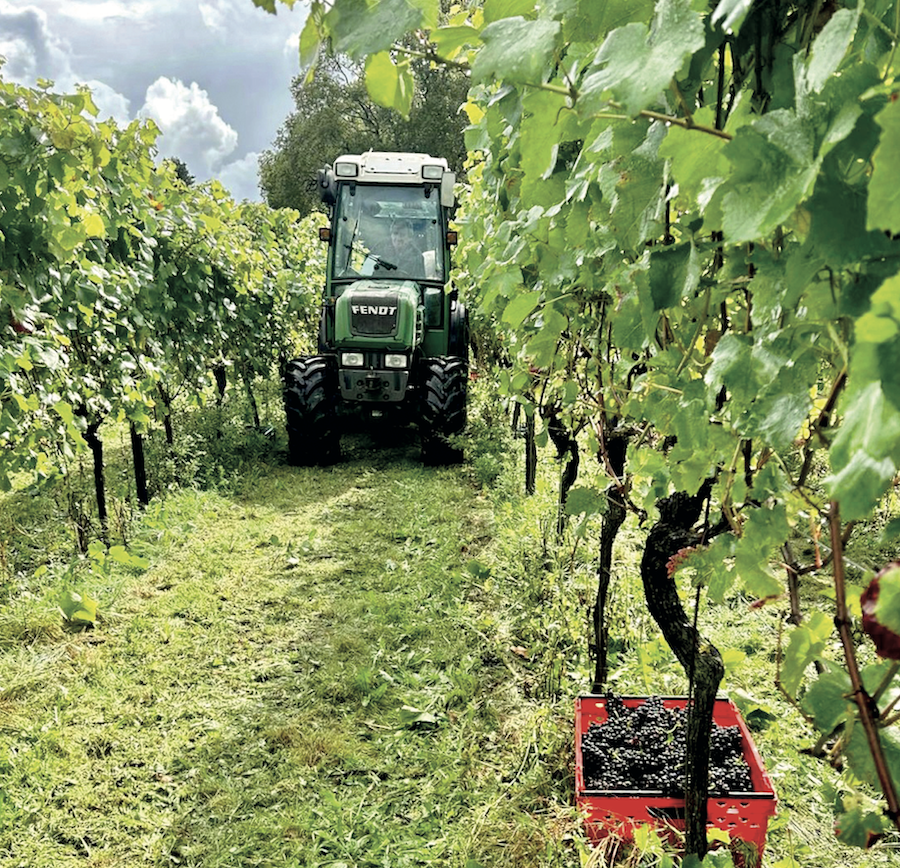
While the Albury team carry out the majority of the vineyard maintenance by hand, some leaf stripping is done using a machine, depending on timing and the variety. They also have a leaf trimmer, which gives the vines a “short back and sides” during the summer months. Bud rubbing is a back-breaking and time-consuming job, for which Albury takes on casual workers.
An under-vine cultivator helps to keep on top of weeds in the absence of chemical controls – however, it’s a very light-touch cultivator, as Nick is keen not to destroy the life in the soil that they have worked so hard to build up.
Sheep from a local farm are usually brought in to graze the weeds in the winter.
Specialist machinery is purchased either new or nearly new via local dealer NP Seymour, and the vineyard currently has two tractors, a vine trimmer, two sprayers, a mower, a cultivator, and a muck spreader for composts in its shed.
Organic viticulture and biodynamics
According to Nick: “Many people ask us why we decided to grow vines organically, and it’s true that managing an organic vineyard is not easy in this country! But we truly believe that organic viticulture produces better quality fruit and, ultimately, better quality wine.
“Going organic is the most difficult part, as you have no systemics when it comes to diseases – difficult when it comes to downy and powdery mildew. The costs of managing an organic vineyard are probably around 40% more, due to the extra management time needed.”
Nick was inspired to take one step further and go biodynamic following a visit to Laverstoke Park Farm, which was a biodynamic farm initially set up by racing driver, Jody Scheckter. There, he saw a presentation by then-head of the Soil Food Web, Dr Elaine Ingham.
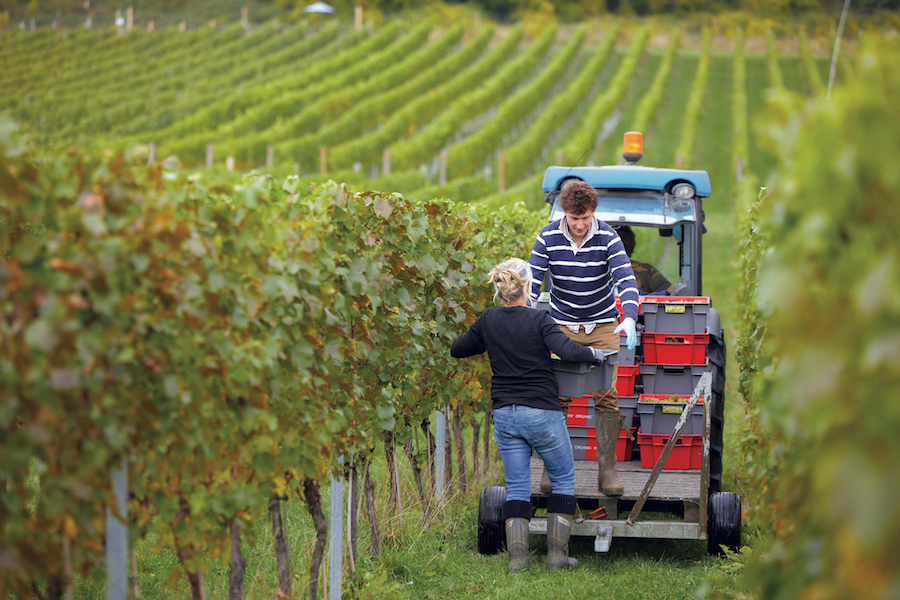
He liked the idea of the holistic approach being presented – achieving harmony between the earth, the plant and the cosmos. There was a commercial element as well, in that it differentiates the business and the wines from others – although this wasn’t the driving force behind Nick’s decision.
Biodynamics excludes the use of artificial chemicals and encourages soil fertility and plant health by using compost teas and biodynamic preparations. Nick explains: “For example, each winter we bury cow horns filled with manure on the vineyard. They are dug up in the spring and the contents sprayed on the vineyard to improve fertility.
“We have actually seen first-hand in France and Australia the difference between the quality of soil on biodynamic vineyards and that on chemically sprayed ones. It is the difference between living and dead soils. Many of the great vineyards and wineries around the world are convinced by the biodynamic approach, including Cristal from Louis Roederer, Domaine Leflaive and le Roy in Burgundy, Coulee de Serant in the Loire, Beaux Freres in Oregon and Hensche in Australia.”
When asked how it makes a difference to the wine, Nick’s response is that biodynamic practices in the vineyard encourage a natural harmony, without the need to use chemicals. He feels this results in a more naturally healthy bio-diverse and sustainable vineyard, producing better quality fruit and, ultimately, better quality wine, with a unique sense of place or terroir.
Sustainability is at the heart of Albury Vineyard. The team are constantly developing their environmental programme as well as social and governance aspects of sustainability.
From 2022, all of Albury’s boxes have been made from 100% recycled materials and are 100% recyclable, improving recycling initiatives, or by reducing waste and the vineyard’s carbon footprint.
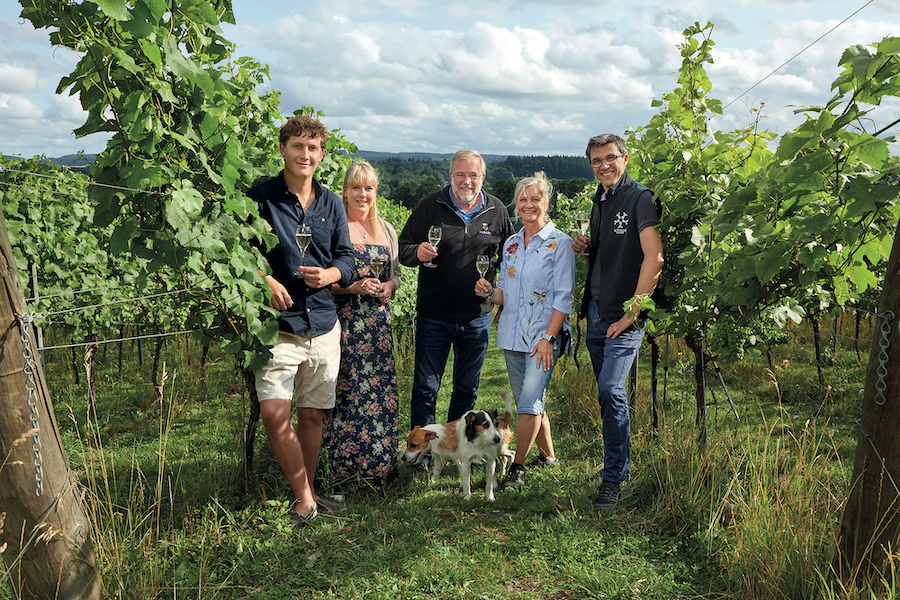
Overcoming pest and disease challenges
One of the biggest issues for viticulture in the UK is the variable weather, and being organic/biodynamic makes it especially challenging to manage.
Frosts in the spring can damage new buds and during the growing season the vineyard still has to contend with the mildews and botrytis.
Late frosts have impacted the vineyard to some degree every year, and currently Nick uses bougies to stave off the worst of it. Alternative frost protection options being considered include irrigation systems, and also an interesting new foam-based system that Nick is hoping to trial this year. It’s an organic preparation which you spray on during the day, and it protects the vines overnight. It just washes off, without causing any damage to the vines.
He has considered other options, including windmills and hot air drains, but none of them suit the topology of the vineyard. For now, the bougies are effective, but not ideal.
The vineyard is surrounded by deer and rabbit fencing which keeps most animals out and the red kites seem to frighten off the smaller birds – although parakeets in nearby vineyards are a worry, Nick says.
Sales and diversifications
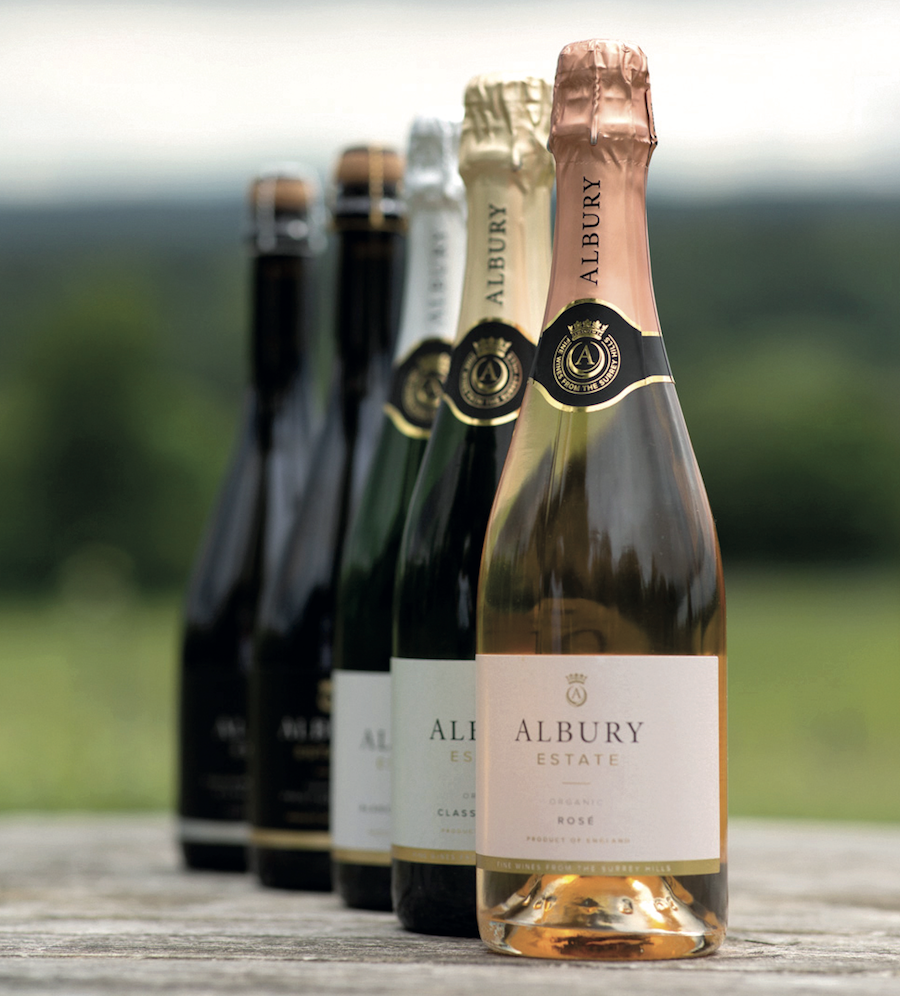
Albury Vineyard sells around 20,000–25,000 bottles per year, of which 60% is sold directly to the public. Nick’s daughter Lucy oversees the business’ marketing and social media, and they also hold a lot of events – including tours and tastings, music events and pop-up restaurant evenings.
The vineyard also collaborated with Surrey Wildlife Trust, Surrey Hills National Landscape and Surrey Choices representatives to create a Woodland Walk, which has been created around the perimeter of the newest part of the vineyard, providing a live habitat for birds, bees, flowers and frogs so wildlife can thrive in the vineyard.
The walk features bat and barn owl boxes, bug hotels, bee hives, butterfly scrapes, an insect highway, wildflower meadows to attract pollinators, compost pits and a pond.
Nick’s future plans are to continue to develop the visitor experience, as well as Albury’s local and organic distribution channels.
Biodynamic calendar impacts buyer wine tasting
Tesco and Marks & Spencer follow the biodynamic calendar when the buyers do their wine tasting. The year is divided up according to the lunar influence into leaf, flower, root and fruit days and fruit days are regarded as the most auspicious for wine drinking. It is believed that the wine actually tastes better on fruit days.
Grower profile
Owner: Nick Wenman
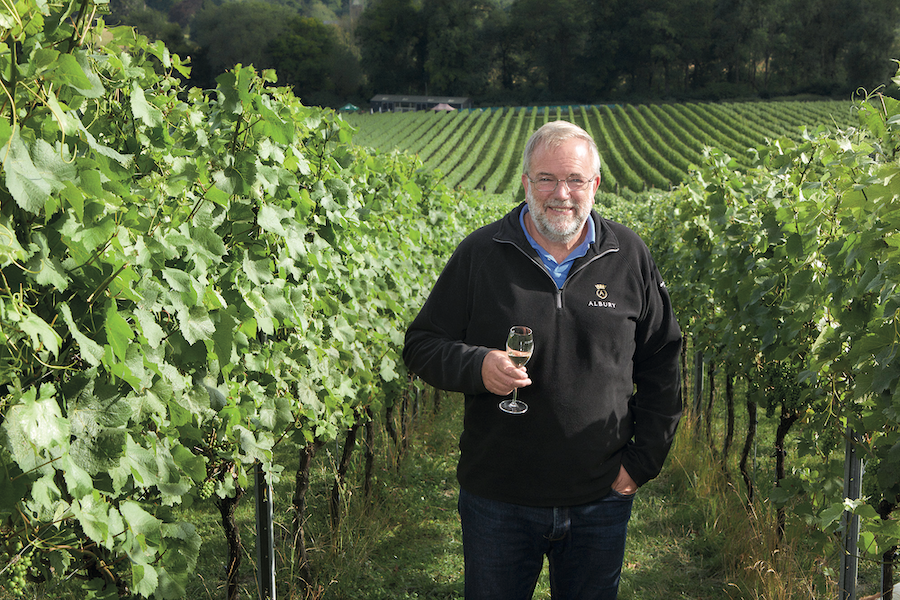
Location: Albury, Guildford, Surrey
Total vineyard size: 10ha, of which 8ha are under vine and the remaining 2ha a wildlife walk
Soil type: Clay on chalk, very similar to the Champagne region
Aspect/terroir: Gentle slope running north to south, with water draining into the chalk and down the hillside
Varieties grown:
- Pinot Meunier – 10,000 vines
- Pinot Noir – 15,000 vines
- Chardonnay – 7,000 vines
- Seyval Blanc – 5,500 vines
- Pinot Gris – 1,000 vines
Read more featured profiles here
